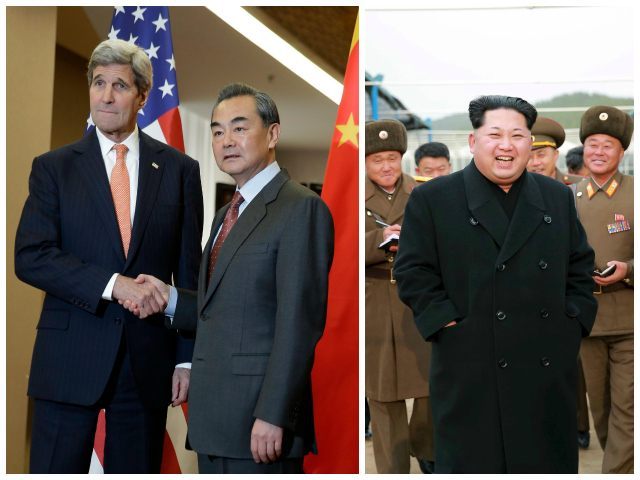China’s state-run Xinhua news agency reports that Foreign Minister Wang Yi has agreed to a new United Nations resolution against North Korean nuclear testing.
“The new resolution should aim to bring the Korean Peninsula nuclear issue back to the negotiating table, rather than stirring up tension or causing chaos on the peninsula,” said Wang, after meeting with U.S. Secretary of State John Kerry.
China wishes to resume six-party talks between itself, North Korea, South Korea, the U.S., Russia, and Japan, which stalled out in 2008.
Xinhua reports that China agrees North Korea’s recent nuclear test — ostensibly of an H-bomb — was a violation of U.N. Security Council resolutions and “threatened the international nuclear non-proliferation system.”
“We reached a consensus that the Security Council could react to the DPRK nuclear test and pass a new resolution,” Wang said of his talks with Kerry. “We agreed that sanctions are not an end in themselves and it is vital to restart dialogue and negotiation.”
According to the New York Times, Kerry warned the Chinese that North Korea seeks to create nuclear weapons small enough to fit on missiles that could reach the U.S., a threat “the United States must take extremely seriously,” and the American government would “do what is necessary to protect the people of our country.”
“Kim Jong Un’s actions are reckless, and they are dangerous,” the Washington Post quotes Kerry saying of North Korea’s dictator. “Whether or not he achieved the explosion of a hydrogen weapon is not what makes the difference. It’s that he is trying.”
The Chinese have effectively resisted new sanctions against their North Korean client state for years, calling instead for a few targeted sanctions against individual North Korean officials, a measure the Times notes would be “unlikely to have serious repercussions.”
Despite the Times’s characterization of Kerry’s approach to China as a “tough tone,” there does not seem to have been much of a shift in the Chinese position; they have always wanted more negotiations, and they still resist tough sanctions. They remain apprehensive about antagonizing the unstable, nuclear-armed North Korean regime. Some analysts think the recent “H-bomb test” was meant as Pyongyang’s gesture of defiance against China.
The most significant change in the China-North Korea situation could be the American deployment of a missile defense system in South Korea, a move the South Koreans have been reluctant to approve, because they didn’t want to irritate China. That calculus may have changed, as the NYT reports South Korean President Park Geun-hye is now thinking about accepting the system.

COMMENTS
Please let us know if you're having issues with commenting.